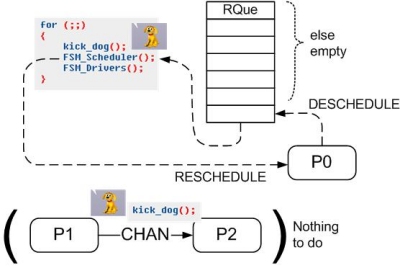By the way, I don't understand the rationale for the term "kicking the dog" to reset its downgoing counter, so that it's again long before it would reach zero. Should we anthropomorphise, then "feeding the dog" should serve better. In particular, for such a nice dog as is used in the figure, namely the Windows operating system's "search dog".
Here, the problem was process P0. It was burning EEPROM,
one "sector" at a time, and then descheduled
itself with no timeout by returning back to the non-preemptive run-time
system's FSM_Scheduler - which
immediately rescheduled
P0.
See "From message queue to ready queue" about RQue and the synchronous channel communication layer
kick_dog
on each rendezvous' memcpy. So we had no kick_dog
on communication and no on empty RQue. Because both of these were
failing, in two seconds the watchdog timed out and restarted the
processor.
Our solution was to insert a short (1 ms) delay in P0,
thus making RQue empty provided the system had nothing else to do. We
could have "yielded" instead, so that FSM_Scheduler
would have returned even if RQue was not empty. In any case, the FSM_Drivers
would now also run - to pick up lower level timer and i/o stuff.
The solution involved no tuning with priority (we have
no such, neither on processes nor messages). No tuning with extra
inserts of kick_dog calls, as we try to avoid
spreading them. We were, however, able to find a solution
without side effects - to keep the self-monitoring embedded system up
and running.
P0 continued burning EEPROM like this way several times, without any problems. Not until we happened to hit the controlling "burn" command to start it again at a time when the processor had little else to do.
The watchdog is kicked every time the main loop "for(;;)"
loops. After this, the main loop runs FSM_Scheduler
- which exits only when the ReadyQueue (RQue) is empty. And, in our
faulty case, other processes (here represented as P1 and P2) had
nothing to do. At least they did not communicate, so, there was no kick_dog
from any moving of data in the CHANnel either.
